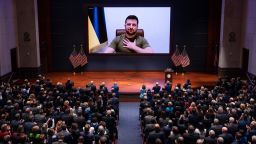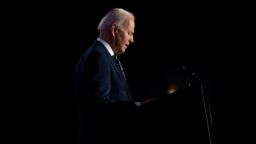Editor’s Note: Nick Dowling is chairman of IDS International, which provides training, cyber, information warfare and technical services to national security customers. He was director of European affairs in the Clinton White House, working to help implement the Dayton Accords. The views expressed in this commentary belong to the author. View more opinion at CNN.
Dressed in his green military T-shirt, Ukrainian President Volodymyr Zelensky ended his live-streamed speech to Congress on Wednesday with a direct appeal to President Joe Biden: “Today it’s not enough to be the leader of the nation … being the leader of the world means to be the leader of peace.” It was not a throwaway line – it was a deliberate plea that Biden should take seriously.

A ceasefire or peace deal in the coming weeks could potentially save hundreds of thousands of lives and untold injuries and suffering. It would reduce the dangerous risk of further escalation and the potential of open conflict between NATO and Russia. And it might be the best option to preserve Ukrainian sovereignty and independence.
Russia and Ukraine have been talking, but negotiations, which are still in the early stages, would benefit from a leader like Biden facilitating the process. Having worked as the director for European affairs at the National Security Council in the Clinton White House, I saw firsthand how essential presidential leadership can be in the cause of peace.
We saw this in Bosnia when early UN peace negotiations efforts failed but US-led negotiations succeeded in 1995 with the Dayton Accords.
US envoy Richard Holbrooke’s success in brokering the deal was only possible because of President Bill Clinton’s personal and direct backing. We saw this again in Northern Ireland in 1998 when Clinton and US mediator George Mitchell helped broker the Good Friday Agreement ending decades of civil war.
Sometimes more direct presidential involvement is essential, as it was when Jimmy Carter brokered the Camp David Accords that brought peace to Israel and Egypt or when President Teddy Roosevelt played a key role in mediating the Treaty of Portsmouth, which ended the Russo-Japanese War in 1905.
Presidential leadership is essential for three reasons.
First, negotiations are extraordinarily difficult because the cause of peace itself often conflicts with deeply felt principles of identity or justice. How do you convince the leader of one country to sit down and negotiate with another who has laid waste to the land and lives of his or her people? These challenges require incredibly strong third-party leadership to focus on the shared goals of peace and stability moving forward.
Second, the United States brings tremendous leverage and power to the negotiating table across the political, economic and military spectrum. American leadership is often at the vanguard of international support and can bring the collective power and influence of much of the world on board.
Third, the American study and practice of peace negotiations give it credibility and expertise, having previously led warring parties to peace – even when one was hostile to the United States. As Egypt’s President Anwar Sadat once said, “The Russians can give you arms but only the United States can give you a solution.” Sadat cited American leadership, even though he knew America was the close ally of his enemy Israel.
Of course, Russia, as America’s historic enemy, is a different beast, and the dynamics surrounding the war in Ukraine make peace talks particularly difficult.
Vladimir Putin, who shows no signs of cowing to the West, has suggested a willingness to use nuclear weapons, and any escalation involving the NATO countries could potentially kick off a world war.
Can the US be a legitimate peacemaker in Putin’s eyes? Yes, given the reasons above, although Biden would have to walk a tightrope given that Putin will likely interact with the US as a negotiating counterpart rather than as a third-party mediator. But the US can still actively engage with both sides to find peace.
China may be able to play a useful role at the negotiating table by serving as a constructive counterbalance to perceptions of US bias. In recent days, China has subtly distanced itself from Russia, and Xi Jinping told Biden the events in Ukraine were in no one’s interest during their two-hour call Friday. But China has not openly condemned Russia, and it remains unclear just what role, if any, Xi is willing to play in brokering peace.
In any case, Biden should push for a peace deal, especially now that the Russian invasion has largely stalled. Nobody signs a peace deal when they think they will be better off continuing to fight. World leaders make the difficult decision to lay down arms when their interests are better served by compromise.
Those conditions are in place right now. Putin has backed himself into a corner, and he needs a way out of the trap he has set for himself. His military campaign is going far worse than anticipated, both on the ground and in terms of global condemnation.
Putin significantly underestimated the Ukrainians’ will to fight, while the US and its allies have announced punishing sanctions on Russia. With the Russian offensive suffering major losses, Putin has no clear military option but to resort to bombarding Ukraine’s cities, terrorizing its people and turning the country into an unlivable hell. This may serve Russia’s short-term strategic objectives, but would incur a far higher political and economic cost in the long run for both Putin and his entire country.
On the Ukrainian side, high morale and heroic resistance may enable Ukraine to resist Russian occupation, but it will not be enough to end the war any time soon. Instead, they will continue to suffer as Putin uses more and more inhumane tactics to inflict punishment.
For Ukrainians, a decision to fight to the end may be akin to a decision to watch the destruction of their nation in a resolute attempt to save it. If Ukraine wants to avoid the devastation of its cities and alleviate widespread suffering, it will have to give Putin at least some face-saving off-ramp if it wants even a chance of striking peace.
Zelensky has already acknowledged it’s unlikely Ukraine will join NATO anytime soon – a move Secretary of State Anthony Blinken called a “reflection of reality.”
There are already ongoing talks of establishing a peace plan that could give both sides a way to declare victory. But peace deals don’t always lead to an immediate resolution – oftentimes, they simply establish a process for continuing to work through contentious issues.
Biden should be thinking about what potential agreements can be struck in the near-term, and what must be punted down the road for more extended talks. His road map to peace should involve three steps: 1) engage Ukraine and Russia separately to help identify interests and establish an agreed upon process; 2) identify interim steps to build confidence and momentum such as a ceasefire, pullback of forces or cooperative humanitarian measures; 3) when the time is right, push more intense negotiations on a peace framework that will start to bring the negotiators face-to-face for long negotiating sessions.
Strong US leadership is essential to the cause of peace. As US presidents have done many times in history, Biden must turn his full attention toward brokering such a deal.



